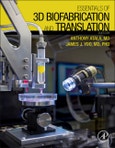The book runs the gamut of topics related to the subject, including hydrogels and polymers, nanotechnology, toxicity testing, and drug screening platforms, also introducing current applications in the cardiac, skeletal, and nervous systems, and organ construction.
Leaders in clinical medicine and translational science provide a global perspective of the transformative nature of this field, including the use of cells, biomaterials, and macromolecules to create basic building blocks of tissues and organs, all of which are driving the field of biofabrication to transform regenerative medicine.
Please Note: This is an On Demand product, delivery may take up to 11 working days after payment has been received.
Table of Contents
Preface
1. Bioprinting Essentials of Cell and Protein Viability
2. Software for Biofabrication
3. Design and Quality Control for Translating 3D Printed Scaffolds
4. Inkjet Bioprinting
5. In vivo and in situ Biofabrication by Laser Assisted Bioprinting
6. Stereolithographic 3D Bioprinting for Biomedical Applications
7. Extrusion Bioprinting
8. Indirect Rapid Prototyping for Tissue Engineering
9. Bioprinting Using Aqueous Two Phase System
10. Bioprinting of Organs for Toxicology Testing
11. High Throughput Screening with Biofabrication Platforms
12. Sensors and Bioprinting for Clinical Translation
13. Polymers for Bioprinting
14. Hydrogels for 3D Bioprinting Applications
15. Bioprinting of Organoids
16. Bioprinting of 3D tissues and Organ Constructs
17. Bioprinting of Bone
18. Bioprinting of Cartilage
19. Biofabrication of Vascular Networks
20. Bioprinting of Blood Vessels
21. Bioprinting of Cardiac Tissues
22. Bioprinting of Skin
23. Bioprinting of Nerve
24. Biofabrication: Industrial Perspective








